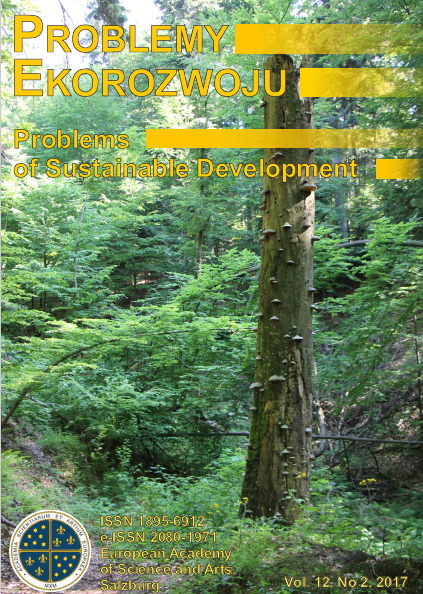ANG B. W., 2004, Decomposition analysis for policymaking in energy: which is the preferred method?, in: Energy Policy, vol. 32, no 9, p.1131-1139.
ANG B.W., CHOI K. H., 1997, Decomposition of Aggregate Energy and Gas Emission Intensities for Industry: A Refined Divisia Index Method, in: Energy Journal, vol.18, no 3, p.59-73.
ANG B. W., ZHANG, F. Q., 2000, Survey of Index Decomposition Analysis in Energy and Environmental Studies, in: Energy, vol. 25, no 12, p. 1149-1176.
ANG B.W., ZHANG F. Q., 1999, Inter-regional Comparisons of Energy-related CO2 Emissions using the Decomposition Technique, in: Energy, vol. 24, no 4, p. 297-305.
BRŮHA, J., ŠČASNÝ, M., 2006, Economic Analysis of Driving Forces of Environmental Burden during the Transition Process: EKC hypothesis testing in the Czech Republic. Paper presented at the 3rd Annual Congress of Association of Environmental and Resource Economics (AERE), Kyoto, 4-7 July, 2006.
DALY H. E., 1996, Beyond Growth: he Economics of Sustainable Development, Beacon Press, Boston.
DRASTICHOVÁ M., 2014, Monitoring Sustainable Development and Decoupling in the EU, in: Ekonomická revue - Central European Review of Economic Issues, vol. 17, no 3, p.125‒140.
EU, 2012, Consolidated Version of the Treaty on the Functioning of the European Union. Official Journal of the European Union, C 326/132.
EUROSTAT, 2016a, Data. Database. Economy and Finance, http://ec.europa.eu/eurostat/data/database (10.12.2016).
EUROSTAT, 2016b, Sustainable development indicators. Indicators, http://ec.europa.eu/eurostat/web/sdi/indicators (10.12.2016).
EUROSTAT, 2016c, Sustainable development indicators. Indicators. Climate change and energy, http://ec.europa.eu/eurostat/web/sdi/indicators/climate-change-and-energy (15.12.2016).
EUROSTAT, 2014,. Eurostat Metadata. Annual National Accounts (nama_10) http://ec.europa.eu/eurostat/cache/metadata/en/nama_10_esms.htm (16.12.2016).
FEEM, 2011, Sustainability Index. Methodological Report http://www.feemsi.org/documents/methodological_report2011.pdf (10.12.2016).
HEDIGER W., 2006. Weak and Strong Sustainability, Environmental Conservation and Economic Growth, in: Natural Resource Modeling, vol. 19, no 3, pp. 359-394.
CHERP A., KOPTEVA I., MNATSAKANIAN R., 2003, Economic transition and environmental sustainability: effects of economic restructuring on air pollution in the Russian Federation, in: Journal of Environ-mental Management, vol. 68, no 2, p.141-151.
IPCC, 2014, Summary for policymakers. In: Climate Change 2014: Impacts, Adaptation, and Vulnerability. Part A: Global and Sectoral Aspects. Contribution of Working Group II to the Fifth Assessment Report of the Intergovernmental Panel on Climate Change. Cambridge, United Kingdom and New York, NY, USA: Cambridge University Press, p. 1-32.
OECD, 2002, Sustainable Development. Indi-cators to measure Decoupling of Environmental Pressure from Economic Growth. [SG/SD (2002) 1/FINAL.], OECD, Paris.
OECD, 2003, OECD Environmental Indicators. Development, Measurement and Use [Refe-rence Paper], OECD, Paris.
PROOPS J. L. R., FABER M., WAGENHALS G., 1993. Reducing CO2 Emissions: a Comparative Input-Output Study for Germany and the UK. Springer, Berlin.
CHUNG H. S., 1998, Industrial Structure and Source of Carbon Dioxide Emissions in East Asia: Estimation and Comparison, in: Energy and Environment, vol. 9 no 5, p. 509-533.
SEIBEL S., 2003, Decomposition analysis of carbon dioxide-emission changes in Germany - Conceptual framework and empirical results. European Communities, Luxembourg.
TSUCHIMOTO F., ŠČASNÝ M., 2011, Decomposition Analysis of Air Pollutant in the Czech Republic. Paper submitted to 18th Annual Conference of the European association of Environmental and Resource Economists (EAERE), Roma 29 June – 2 July 2011.
UNFCCC, 2015, Kyoto Protocol, UN.
VEHMAS J., LUUKKANEN J., PIHLAJAMÄKI M., 2008, Decomposition Analysis of EU Sustainable Development Indicators. Final Report of the DECOIN project (Development and Comparison of Sustainability Indicators), Deliverable D3.1 of WP3, Turku School of Economics, Finland Futures Research Centre, Turku.
VIGUIER L. 1999, Emissions of SO2, NOx and CO2 in Transition Economies: Emission Inventories and Divisia index Analysis, in: Energy Journal, vol. 20, no 2, p.59-87.
WCED, 1987, Our common future. Oxford University Press, Oxford.
XU X. Y., ANG B. W., 2013, Index Decomposition Analysis applied to CO2 Emission Studies, in: Ecological Economics, vol. 93, p.313-329.



